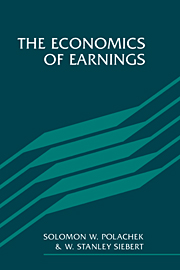Book contents
- Frontmatter
- Contents
- Foreword
- Preface
- 1 Introduction: the importance of life-cycle analysis
- 2 The life-cycle human capital model
- 3 Schooling
- 4 Post-school investment
- 5 Labour supply
- 6 Gender in the labour market
- 7 Compensating wage differentials and heterogeneous human capital
- 8 Information and wages
- 9 Payment systems and internal labour markets
- 10 Unionisation
- References
- Subject index
- Author index
Foreword
Published online by Cambridge University Press: 18 September 2009
- Frontmatter
- Contents
- Foreword
- Preface
- 1 Introduction: the importance of life-cycle analysis
- 2 The life-cycle human capital model
- 3 Schooling
- 4 Post-school investment
- 5 Labour supply
- 6 Gender in the labour market
- 7 Compensating wage differentials and heterogeneous human capital
- 8 Information and wages
- 9 Payment systems and internal labour markets
- 10 Unionisation
- References
- Subject index
- Author index
Summary
The processes by which people develop their skills at school, at work, and through geographic mobility and job search are basic to an understanding not only of why their earnings differ, but to an understanding of a country's economic and social development as well. To be sure, other factors also influence earnings, for example, discrimination, trade union membership, inherited ability – or, simply, luck. But the importance of all these factors can be better assessed if the individual's skill development process and its consequences are understood. Moreover this process is important from the policy viewpoint, since many government policies influence skill acquisition either intentionally or unintentionally.
The basic merit of human capital theory for labour economics is its ability to handle analytically the heterogeneity of labour and the time-bound investment processes that play a role in creating heterogeneity. The concept of human capital is ancient, and has been eloquently stated by Adam Smith. However the steps towards a systematic economic analysis of human capital formation and its implications for labour economics were taken only three decades ago. Since then an extensive literature has grown up. In it, human capital analysis forms the basis for the study of the economics of education and training, of individual and group differences in earnings and earnings growth, of labour mobility and its consequences, and of firms' compensation policies.
- Type
- Chapter
- Information
- The Economics of Earnings , pp. xiii - xivPublisher: Cambridge University PressPrint publication year: 1993



